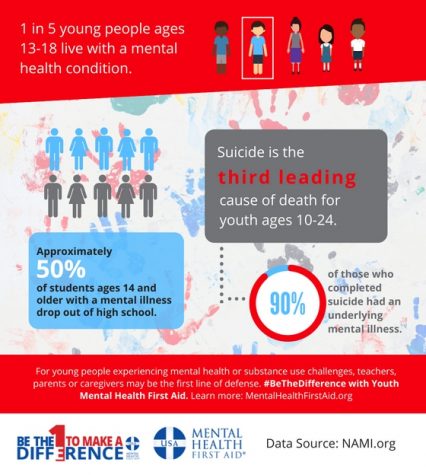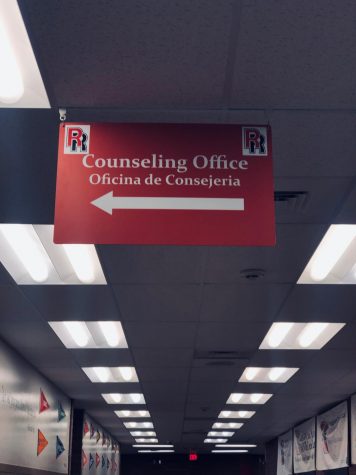Are Mental Health Days a Good Idea?
Junior Thien Nguyen sits in the commons. He is stressed out for his honors math final. (Samrawit Kopessa)
October 8, 2019
Have you ever come to school, feeling mentally exhausted and wanting to take a break from school to gather yourself mentally?
Many believe being a high schooler comes with many responsibilities, one of them being managing school work with mental health. Whether it’s the SAT, quizzes, or even homework, students are always expected to understand the knowledge they need to enhance their learning for the future, under a certain amount of time.
As a Junior, the effect of preparing for the SAT and taking CCA and AP classes have made these nine
weeks of school stressful. Being expected to take these challenging classes, being involved in the school’s community, and taking a test that will play a big factor on which college you go to, takes a toll on students mentally.

So should schools allow students to take mental health days?
According to The New York Times on July 1, 2019, Oregon passed a law that went into effect that would allow students to take five mental health days in a three-month period.
This bill will give students the opportunity to take mental breaks from school and still have the chance to make up any missed work or tests.
Mental health experts say that the bill is “one of the first state laws to require schools to treat mental health and physical health equally, coming at a time where teachers increasingly consider the emotional health of students.”
Depression can be caused by school pressure where many students experience some degree of academic pressure, only getting worse when students go on to higher education.
Juniors Samantha Fuentes and Koyinsola Oyefesao share the same idea. Fuentes said, “I think mental health days would help just because everybody needs time to process and have time to just take a breather, especially since students are always on the go.”
Many students have the same argument as Fuentes and Oyefesao, expressing the fact that school takes away from their social lives and the time to just relax.
After interviewing multiple students, they came up with these lists of pros and cons on whether mental health days should be something Colorado or even Rangeview should look into.
Mental Health Days pros and cons:
Pros:
- Allows students to prioritize their mental state and well-being
- Gives students a break to gather themselves
- Might increase a student’s performance in school
- Decreases stress!!!
Cons:
- Might be taken advantage of or used as an excuse
- Missing work
- Having to catch up after returning
- Exploitation

There is a sign outside of the Counseling Office indicating where it is. “In my opinion, talking to a counselor wouldn’t be an option,” Junior Blessed Asare said. “I don’t feel open talking to a counselor about personal things; by giving us students a mental health day it really would be beneficial.” (Samrawit Kopessa)
This bill has received great support within the students at Rangeview; however, the adults feel differently.
When asked if he agreed with the idea of having mental health days, Dean Mr. Anderson said, “No, I don’t agree with having mental health days when you can come to school and get support from your counselors rather than staying home and using your phone.”
But are counselors enough to help students with depression, anxiety, or even academic stress? Or is having time to yourself better?
Hall monitor Rock said, “No, I don’t think it is necessary for students to have mental health days; life is already stressful itself. I’m stressed and I still attend my job. Over time you need to learn how to deal with it and not use that as an excuse.”
Having mental health days would benefit and improve how students perform in school, and it would increase engagement in classrooms. In today’s society, there’s a lot of talk about mental health, but nothing is being done.
Students need more support in times where they feel overloaded with homework, or when they feel they’re mentally unstable. The question now is, will Colorado follow Oregon and put this bill in effect, or will students continue to feel pressured academically and mentally?














Norman Osborn • Feb 6, 2023 at 12:55 PM
This was very boring bet helped me get a C
Sarah Jefferson • Feb 6, 2023 at 12:56 PM
you hot man
Grandpa Joe • Mar 2, 2023 at 7:42 AM
He sure is
quinn • Nov 8, 2021 at 4:41 AM
Sometimes people need time to collect themselves, kinda hard going to class when you don’t even wanna live.. while you think it won’t be beneficial for you, doesn’t mean it won’t be for others. Mental health days should be available and valid because it’s just like any physical health problem. Just because it’s available doesn’t mean you have to take one, but leave the option for those who can benefit from it..
D • Nov 7, 2021 at 10:26 PM
Dean and janitor are definitely old old old school. Mental health is a serious issue. Many people lose their lives against theirbattle with mental health and you want them to deal with it LMAO. School system failing the youth.
Mariah • Sep 2, 2020 at 10:59 AM
I disagree with the mental health days. I totally understand being stressed out and having severe anxiety, I am one of those people, but why would you want to miss school and make matters more stressful on yourself. If you miss school you will then get behind and in some classes catching up is really hard and that is very stressful.
Zarr • Oct 13, 2021 at 7:39 PM
To you, missing days would be stressful but not for everyone else.
Miriam • Feb 22, 2022 at 8:37 AM
The good thing about mental health days now is that we have virtual learning platforms for students, as well as virtual platforms to work from home. I understand the catching-up problem, but with these resources, we can stay caught up. As a student with severe anxiety, mental health days would be very beneficial to my academic progress, as well as my overall mental health.
keeli • Jan 27, 2023 at 12:55 PM
would you mind if I use your comment in my essay on mental health days?